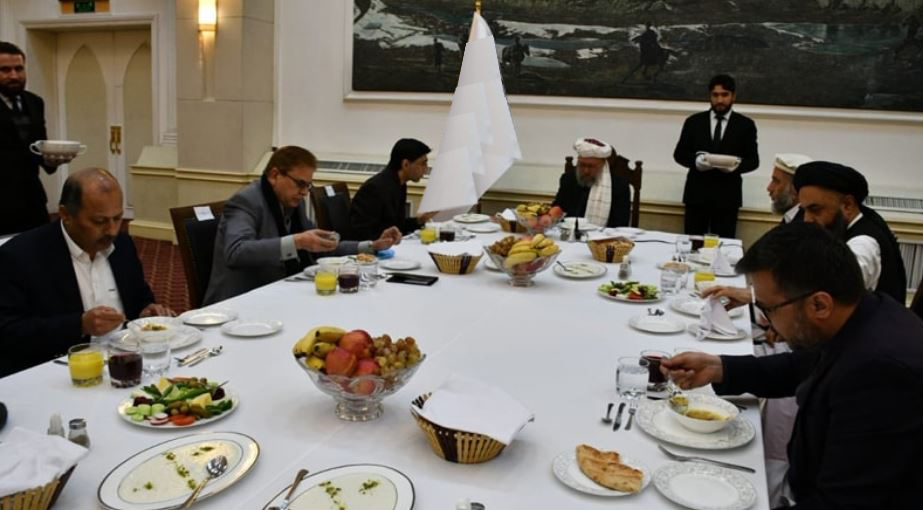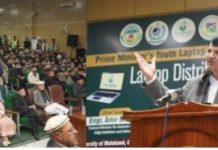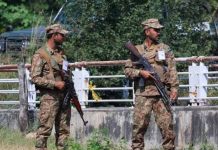KABUL: Afghanistan acting Deputy Prime Minister Abdul Salam Hanafi assured on Saturday a high-level Pakistani delegation, led by National Security Adviser (NSA) Moeed Yusuf, that Afghan soil would not be used against its neighbours, including Pakistan.
A statement issued by the presidential palace in Kabul quoted Hanafi as saying: “The policy of the Islamic Emirate [of Afghanistan] is clear that we will not allow anyone to use Afghan soil against [our] neighbours and other countries.
“We also want similar action from others,” he added while hosting the inter-ministerial delegation in the Afghan capital, which had arrived earlier in the day.
The assurance from the Taliban government in Kabul comes amid a spike in attacks by the banned Tehreek-i-Taliban Pakistan — whose leadership is said to be headquartered in Afghanistan — in Pakistan after the group declined last month to extend a ceasefire with Islamabad.
Bilateral cooperation
Separately, Pakistan Ambassador to Afghanistan Mansoor Ahmad Khan tweeted that NSA Moeed Yusuf called on Hanafi and discussed the strengthening of brotherly relations between Pakistan and Afghanistan to promote trade, transit and connectivity.
In this regard, the statement by the presidential palace said Hanafi urged Pakistani business leaders and investors to invest in Afghanistan’s energy, mines and agriculture sectors.
He stressed the need for the implementation of major regional projects, including the Turkmenistan-Afghanistan-Pakistan-India gas pipeline (Tapi), Turkmenistan-Afghanistan-Pakistan 500-kV Line (TAP-500) project and the Central Asia South Asia Electricity Transmission and Trade Project (CASA-1000), for the import of electricity from two Central Asian countries by Afghanistan and Pakistan.
“Pakistan and Afghanistan are two brotherly neighbouring countries which have historical, religious and brotherly relations and I am confident that the[se] friendly relations will be durable,” Hanafi said and thanked Pakistan for helping and hosting refugees from Afghanistan.
He said Afghanistan wanted good relations with Pakistan, based on mutual respect, and the promotion of trade and transit relations between the two countries.
For his part, NSA Yusuf emphasised that peace and stability could not be ensured without establishing economic relations and said the expansion of trade and transit ties were important for both countries.
“Pakistan is committed to the full implementation of major projects and both countries should form a team of private sector to hold talks about the expansion of health, education, trade, mines, information technology,” he said, according to the statement.
Both sides also discussed ways to ensure more facilities for Afghan passengers and patients at the Torkham and Spin Boldak gates, the statement further said.
Purpose of the visit
The delegation led by NSA Yusuf is visiting Kabul for talks on bilateral matters of mutual interest, focusing on Pakistan’s efforts to avert a humanitarian crisis in the war-torn country.
The visit was earlier scheduled on January 18 but the trip was delayed due to bad weather.
Upon arrival in Kabul today, the NSA and his delegation were received by Nooruddin Azizi, the acting minister for commerce and industry, at Hamid Karzai International Airport, according to the Pakistan Embassy. Senior officials, including Pakistan’s Special Representative for Afghanistan Mohammad Sadiq, were also part of the delegation.
Following the delegation’s arrival, Ambassador Khan said the NSA had a “productive meeting” with Afghanistan’s Foreign Minister Amir Khan Muttaqi to kick off the visit. “[He] will have multiple official meetings to strengthen humanitarian and economic engagement,” he tweeted.
According to officials of relevant ministries, the purpose of the visit was to ascertain the humanitarian, economic and development needs of Afghanistan in various sectors.
Earlier, Afghanistan state Bakhtar news agency had reported: “Pakistan’s national security adviser is to discuss border issues, trade and economic ties with Islamic Emirate of Afghanistan (IEA) officials during his visit to Kabul.”
The main sectors of Pakistan’s cooperation with Afghanistan include health, higher education, provision of humanitarian assistance, and enhancement of trade/business contacts.
The Afghanistan Inter-Ministerial Coordination Cell established by Pakistan was working tirelessly on plans of assistance to Afghanistan in the past few weeks.
The NSA is steering the cell to channel Pakistan’s humanitarian and economic assistance to Afghanistan in a manner that helps the Afghan interim authorities in combatting their key challenges while adhering to the requirements of the UN and international sanctions.
The Afghan ministers for health, higher education, finance and commerce undertook visits to Islamabad in recent months for strengthening collaboration in these areas. The plans for assistance in these areas are likely to be finalised during the NSA’s visit.
One key challenge for Afghanistan’s Taliban rulers is the exodus of skilled human resources from the country.
In this regard, Prime Minister Imran Khan’s recent statement about “exporting qualified and trained manpower” to Afghanistan was apparently misconstrued and sparked a reaction on Afghan social media.
Relevant Pakistani officials argue that Pakistan was actually contemplating opportunities for Afghan refugees who were educated and trained in Pakistan to serve in Afghanistan’s public and private sectors to fill the gap in the country’s human resource requirements.
Apart from the bilateral channel, Pakistan has also been facilitating assistance to Afghanistan through international organisations, particularly the UN and Organisation of Islamic Cooperation (OIC). The OIC foreign ministers’ special session in Islamabad on December 19, 2021, and the decisions to establish an OIC Trust Fund as well as appoint a special envoy on Afghanistan to oversee humanitarian and economic engagement are reflective of Islamabad’s efforts to support Afghanistan at this crucial time.
















